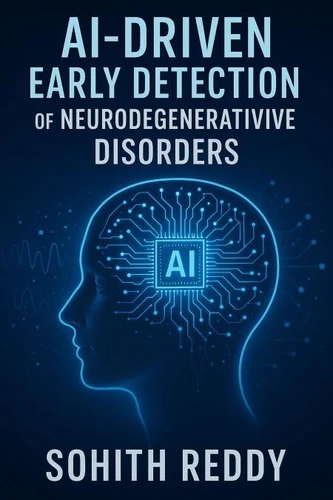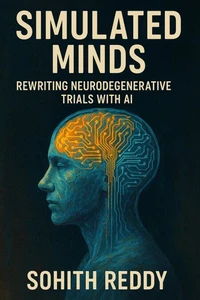Nouveauté
AI-Driven Early Detection of Neurodegenerative Disorders
Par :Formats :
Disponible dans votre compte client Decitre ou Furet du Nord dès validation de votre commande. Le format ePub est :
- Compatible avec une lecture sur My Vivlio (smartphone, tablette, ordinateur)
- Compatible avec une lecture sur liseuses Vivlio
- Pour les liseuses autres que Vivlio, vous devez utiliser le logiciel Adobe Digital Edition. Non compatible avec la lecture sur les liseuses Kindle, Remarkable et Sony
 , qui est-ce ?
, qui est-ce ?Notre partenaire de plateforme de lecture numérique où vous retrouverez l'ensemble de vos ebooks gratuitement
Pour en savoir plus sur nos ebooks, consultez notre aide en ligne ici
- FormatePub
- ISBN8231335695
- EAN9798231335695
- Date de parution17/07/2025
- Protection num.pas de protection
- Infos supplémentairesepub
- ÉditeurWalzone Press
Résumé
AI-Driven Early Detection of Neurodegenerative Disorders is a student-written guide exploring how artificial intelligence is reshaping how we detect and understand diseases like Alzheimer's, Parkinson's, ALS, and Huntington's. Written from the perspective of a final-year undergraduate researcher, this book brings together the latest tools, techniques, and case studies from neuroscience, bioinformatics, and machine learning - all in one place.
Whether you're a curious student, a budding researcher, or just someone intrigued by the future of medicine, this book aims to make complex topics feel accessible and real. Across 15 thoughtfully structured chapters, you'll dive into:?? The biology behind neurodegeneration?? How AI is transforming diagnostics and clinical workflows?? The role of biomarkers, multi-omics, and genomic data??? Innovative approaches using speech, wearables, and imaging?? Predictive models built for diseases like Alzheimer's, Parkinson's, ALS, and Huntington's?? Challenges around data quality, clinical translation, and ethics This isn't just a technical handbook - it reflects a student's journey through cutting-edge research, internships, and international collaborations.
It's also a call to action for young scientists to join in building AI systems that are trustworthy, explainable, and truly helpful for patients. So, whether you're looking to build your next ML project in healthcare or understand how AI can give hope to millions living with neurodegenerative conditions, this book is for you.
Whether you're a curious student, a budding researcher, or just someone intrigued by the future of medicine, this book aims to make complex topics feel accessible and real. Across 15 thoughtfully structured chapters, you'll dive into:?? The biology behind neurodegeneration?? How AI is transforming diagnostics and clinical workflows?? The role of biomarkers, multi-omics, and genomic data??? Innovative approaches using speech, wearables, and imaging?? Predictive models built for diseases like Alzheimer's, Parkinson's, ALS, and Huntington's?? Challenges around data quality, clinical translation, and ethics This isn't just a technical handbook - it reflects a student's journey through cutting-edge research, internships, and international collaborations.
It's also a call to action for young scientists to join in building AI systems that are trustworthy, explainable, and truly helpful for patients. So, whether you're looking to build your next ML project in healthcare or understand how AI can give hope to millions living with neurodegenerative conditions, this book is for you.
AI-Driven Early Detection of Neurodegenerative Disorders is a student-written guide exploring how artificial intelligence is reshaping how we detect and understand diseases like Alzheimer's, Parkinson's, ALS, and Huntington's. Written from the perspective of a final-year undergraduate researcher, this book brings together the latest tools, techniques, and case studies from neuroscience, bioinformatics, and machine learning - all in one place.
Whether you're a curious student, a budding researcher, or just someone intrigued by the future of medicine, this book aims to make complex topics feel accessible and real. Across 15 thoughtfully structured chapters, you'll dive into:?? The biology behind neurodegeneration?? How AI is transforming diagnostics and clinical workflows?? The role of biomarkers, multi-omics, and genomic data??? Innovative approaches using speech, wearables, and imaging?? Predictive models built for diseases like Alzheimer's, Parkinson's, ALS, and Huntington's?? Challenges around data quality, clinical translation, and ethics This isn't just a technical handbook - it reflects a student's journey through cutting-edge research, internships, and international collaborations.
It's also a call to action for young scientists to join in building AI systems that are trustworthy, explainable, and truly helpful for patients. So, whether you're looking to build your next ML project in healthcare or understand how AI can give hope to millions living with neurodegenerative conditions, this book is for you.
Whether you're a curious student, a budding researcher, or just someone intrigued by the future of medicine, this book aims to make complex topics feel accessible and real. Across 15 thoughtfully structured chapters, you'll dive into:?? The biology behind neurodegeneration?? How AI is transforming diagnostics and clinical workflows?? The role of biomarkers, multi-omics, and genomic data??? Innovative approaches using speech, wearables, and imaging?? Predictive models built for diseases like Alzheimer's, Parkinson's, ALS, and Huntington's?? Challenges around data quality, clinical translation, and ethics This isn't just a technical handbook - it reflects a student's journey through cutting-edge research, internships, and international collaborations.
It's also a call to action for young scientists to join in building AI systems that are trustworthy, explainable, and truly helpful for patients. So, whether you're looking to build your next ML project in healthcare or understand how AI can give hope to millions living with neurodegenerative conditions, this book is for you.




